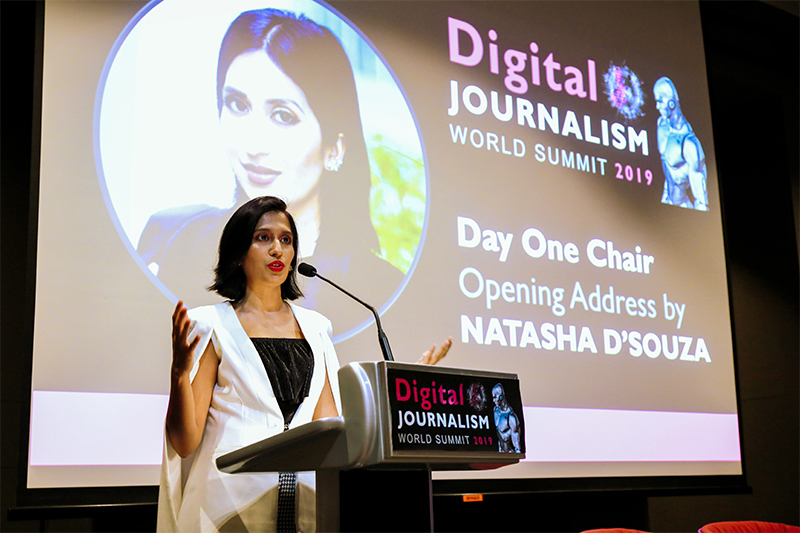In an age where social media prominence seemingly exemplifies substance, business journalist Natasha D’Souza talks to Hive Life about how to share meaningful messages that stick.
Juggling roles as a charismatic host and speaker for global technology conferences including Hong Kong FinTech Week and Future Blockchain Summit, as a business journalist specialising in Asia and as a growth strategist focused on reputation building for startups and entrepreneurs, Natasha D’Souza is consumed with the art of storytelling. From handling investor communications for a USD 2 billion commercial development at the height of the global financial crisis to championing awareness about social enterprise in the UAE as a chapter leader of impact investment fund Acumen to spearheading a fresh take on brand journalism for Sarwa, the first robo-advisor in the Middle East, she mines her various experiences as she talks to Hive Life about the key to crafting a compelling and credible story for founders and their businesses.

#1
Focus on personal ethos rather than personal brand
Personal image, while important, can also be just a façade. Instead, focus on your conviction and what you stand for. “The notion of a personal brand existed long before we gave it that moniker. Throughout history, we’ve been fascinated by leaders and visionaries – they’ve captured our imaginations because they’ve created movements and companies that have completely changed the way we function.” However, with the ease of the Internet, Natasha believes that “many individuals and entities are in the pursuit of creating this illusion of impact versus actually having a proven body of work.” Now, you often see people on Instagram sticking to a certain colour scheme or regurgitating, often uncredited, quotes. “To me, personally, it comes across as contrived. And, as human beings, we’re not contrived. We are flawed. We have ups and downs. We evolve. We change. People will trust you more based on how authentic you are and how your values are reflected in your work over time. It’s not about your personal brand but about a personal ethos.”
#2
Show, don’t sell
When it comes to sharing your company’s mission and value proposition, Natasha encourages people to look beyond the superficial metrics of selling a message. Instead, shape a meaningful story, and stick to it. “We live in a time when people place a lot of emphasis on projection and optics. They keep changing their tune to see what works. Unfortunately, that often comes across as lacking real substance and an original point of view, and ultimately it affects traction.”
She suggests that consumers are more attentive than one might think. “People are very intelligent. They can tell if you’re selling them something, which in effect is greedy, because you’re making an ask of them versus giving them value, whether that’s through knowledge, entertainment or inspiration. We see so much online; we can tell very quickly if you’re trying to sell to us versus telling us a story that’s actually interesting.”
“Have a couple of solid pillars in your message that you can always come back to. Once you have those foundational messages in place, then you construct everything else around it from your press releases to leadership op-eds to social media posts.”
You might also like 5 Growth-Hacking Strategies You Need to Grow Your Business Fast

#3
Social media is not the pinnacle of presence
In an era where documenting your life online appears to be mandatory on social media, Natasha believes in the need to do it mindfully. “Everybody’s putting out content because they feel they need to be relevant. But, what does that content say about you? Are you putting out something that’s vital or interesting or notable in any way? People and businesses are spending thousands on getting their Instagram growth right when that often has very little to do with growth fundamentals at the very core of an enterprise. The fact is that platforms like Instagram are simply tools of the moment; they may not stay here forever, and I’m saying this as somebody who saw platforms like MySpace come and go. There are lots of other ways that you can create a focal point for your work that doesn’t have to be social media-oriented, if social media is not your thing.” Alongside other traditional avenues such as blogs, podcasts and contributing to publications, Natasha suggests that it’s just as important to build your connections offline. “Speaking on the subject of your expertise at professional/peer groups or establishing a relationship with local radio/news stations so you get called in to comment on specific subjects are also other ways to establish your positioning. Find the level of participation and rhythm that works for you, and be consistent.”
#4
Good intentions can grow your business
You need to question whether your business adds more than a commercial spin to a critical social or environmental issue. “It’s totally fine to have an intention, but I think the intention should have an authentic connection to either the founder and/or the company beyond just piggybacking off of a trending topic like ethical supply chains or climate change to score sales.”
#5
You don’t have to be an extrovert or a public speaker to be a successful communicator
Look past the assumption that successful founders have to be extroverts and great speakers in order to spread their message. “A lot of people tend to assume that to get people’s attention, I need to be a good public speaker.” Public speaking is an important skill to cultivate and everyone can develop their own presenting style regardless of personality type. But, before attempting a stage, you can still create a blog, podcast or contribute to a publication that serves as a gateway for your work. Find ways to build your authority within the space first and share this content with your network so they know what you stand for. That’s the way I would look at it,” explains Natasha.
#6
How does what you do move people?
“Emotions are really important in a lot of our consumption decisions. What can I find in your message, your story that can make people feel moved enough to buy this product or service, or support you or your company in any way?”
#7
Be nimble and craft your career along the way
Natasha advocates the importance of being adaptable within an ever-changing job market. “I always knew that I was good at a lot of different things, and that I could use those skills to be impactful. But, I also wanted to be able to monetise my talent and expertise. It’s so easy to get comfortable with a job. Companies, CEOs, jobs don’t always last. Building a sustainable career in today’s marketplace necessitates making yourself relevant and impactful, with or without a job.” To do that, you need to recognise what you have at your disposal. “First, figure out what skills and services you have that you can command a price for, and also find out existing market rates. Make that known on a website like UpWork, Fiverr, or let local SME business owners, associations and startup groups know about your offerings. If there is a brand or company you would love to work with, be proactive and reach out to them with your concept. That’s exactly what I did with Sarwa and the result? A year-long storytelling series with a fresh spin on financially savvy content! Nothing ventured, nothing gained.”
Related Articles
5 Top VC Tips for Entrepreneurs in Southeast Asia
This Silicon Valley Startup is Taking LinkedIn to the next level. Here’s how.
From Google to Twitter, Silicon Valley Prodigy Builds Startup with Speculated USD200M Valuation





